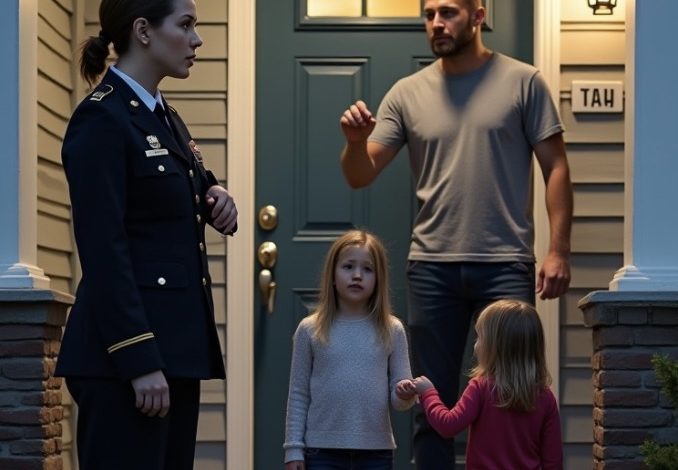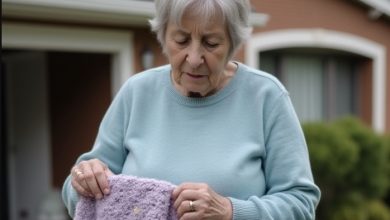“She Stepped Off the Plane in Her Uniform, Ready to Reunite With Her Family—But What Her Husband Had Done During Her Absence Sparked a Battle She Was Trained to Win”

I had just stepped off the plane, my boots touching American soil for the first time in three years, when my phone buzzed with a message that cut through me like a blade.
“Don’t come back. I’ve changed the locks. The kids don’t want you. It’s over.”
Derek had sent it three minutes before my plane landed. Three minutes. After three long tours of service, thirty-six months away from home, after sleeping on cots and eating field rations, after thinking of my own bed every night, my husband ended our marriage with a text.
I stared at the words as the crowd around me at Memphis International Airport swirled like a sea. Children laughing, people hugging, someone playing music on a phone speaker—all the normal noise of civilian life—but to me it sounded distant, unreal, like I was still in a combat zone.
I typed three calm words back.
“As you wish.”
Those three words were my new mission order. Derek thought he had the upper hand. He didn’t realize I had been preparing for this moment for years.
A woman brushed against me and stopped when she saw my uniform. Her eyes filled with tears. “Thank you for your service,” she whispered.
I could only nod. How could I explain to a stranger that while I had been fighting for my country, my own home had been turned into hostile territory?
I lifted my duffel bag higher on my shoulder and walked out into the Tennessee sunlight. Captain Vera Holloway wasn’t just a soldier. She was a planner. And she had a plan.
Three years earlier, before my first deployment, my grandmother—Honorable Judge Cordelia Nash—had sat me down in her study. The room smelled of leather and old books, lined with photos from her forty-year career on the federal bench.
“Sweetheart,” she said, pulling a thick manila folder from her desk, “always protect yourself legally. I’ve seen too many soldiers come back to nothing because they trusted someone who changed while they were gone.”
“Derek would never—” I began, but she raised her hand, stopping me.
“The Derek you know today might not be the Derek you find in three years. War changes everyone. The ones who go, and the ones who stay.”
So I signed the papers she had prepared: a carefully limited power of attorney, separate bank accounts for my combat pay, a family care plan naming her as emergency guardian if Derek became unfit or unwilling to care for our kids, Maddox and Brinn.
The house, bought with my VA loan before our marriage, stayed in my name only. Derek laughed when he signed his part, hardly glancing at it. “You’re paranoid, Cordelia,” he said. “Vera and I are solid, right, babe?”
Standing in that airport now, reading his cold dismissal of our fifteen years together, I silently thanked my “paranoid” grandmother.
Because Derek had just tried to ambush someone who plans missions for a living.
My phone rang. It was Sterling Vaughn, my military lawyer.
“Vera,” he said without preamble. “A process server just contacted me. Your husband filed for divorce yesterday. He’s claiming abandonment and asking for full custody plus alimony. Says you’ve been gone too long to be a fit parent.”
I closed my eyes for one long breath. “Sterling, remember Operation Homefront? Execute it. All of it. Now.”
“With pleasure, Captain. Where are you?”
“Memphis International. Heading to my grandmother’s house. According to Derek, the locks are changed on mine.”
“He’s about to learn what happens when you change the locks on a house you don’t own,” Sterling said, and I could hear the smile in his voice.
“He thinks he ambushed me,” I replied, walking toward the taxi stand with a soldier’s posture returning to my spine. “But you can’t ambush someone who’s been preparing for betrayal since the day she left. He wanted a war. He just got one.”
Another text buzzed through as I crossed the street.
Also, I’ve been seeing someone. Nadira understands the kids need stability—something you clearly can’t provide.
I took a screenshot, adding it to the digital folder I had been building for six months, ever since odd charges started appearing on the joint credit card Derek didn’t know I still monitored.
Three tours had taught me a lot: how to function on two hours of sleep, how to make life-or-death choices in seconds. But most of all, how to plan for every outcome—and for what to do when the enemy finally shows their true face.
When I had left for Fort Campbell three years earlier, Derek had promised to “keep the home fires burning.” Maddox, then eleven, tried to be brave, though his chin quivered. Eight-year-old Brinn clung to my leg, begging me to FaceTime every week.
“Mommy’s going to help keep everyone safe,” I told them. “And when I come back, we’ll go to Disney World. All four of us.”
The first tour went well. We had a rhythm—daily emails, weekend video calls, care packages like lifelines. But by the second tour, the calls grew shorter. Derek would angle the camera so I could barely see him. “Real estate’s crazy,” he’d say. “You don’t want to see me anyway; I haven’t shaved.”
By the third tour, he often stopped answering entirely. A text would pop up instead: Connection’s bad, babe. Kids at practice. Try tomorrow. Tomorrow never came.
Six months ago the real warning signs began. Brinn stopped appearing on calls. “She’s going through a phase,” Derek said, eyes darting off camera. Maddox, once eager to tell me everything, started speaking in one-word answers. “Dad said not to bother you with kid stuff,” he mumbled. “You have important things to worry about.”
Then came the credit card alerts: expensive dinners at restaurants I’d never heard of, a $3,000 Cartier purchase. “Business expenses, babe,” Derek had laughed, too bright, too forced. “Got to wine and dine clients. The jewelry was an anniversary gift for a client’s wife. Sealed a big commission.”
It sounded plausible but felt wrong, like a familiar picture hung crooked.
Two weeks before my return, I called home unexpectedly. A woman answered on the second ring, her voice young and breathy.
“Oh, you must be Vera. Derek’s told me so much about you. I’m Nadira. I’m helping with the kids while you’re away.”
My blood turned to ice. “Helping how?”
“You know, being here for them. Derek says they needed a maternal figure. Someone consistent.” She paused, all false sympathy. “We’re planning Brinn’s birthday dinner—a whole princess theme!”
Brinn’s birthday was three months away. She hadn’t liked princesses since she was seven.
I hung up, my grandmother’s voice echoing from a call two days prior. “Something’s not right, Vera. I drove by your house. There was a moving truck. A new bedroom set.”
Now, standing in that airport, all the pieces clicked together. Derek hadn’t just moved on. He had replaced me.
But he had forgotten one thing: I was a logistics officer. We don’t just plan for victory. We guarantee it.
I sat on a hard airport bench and made the call that would change everything.
“Sterling, it’s Vera Holloway. Time to execute Operation Homefront.”
“You still have all the paperwork?” he asked, his keyboard clicking in the background.
“Every document notarized. Plus the family care plan naming my grandmother as emergency guardian. And Sterling, I’ve documented everything for six months. Every missed call, every expense. Screenshots, bank records, credit card statements.”
“How much equity in the house?”
“Four hundred thousand. VA loan in my name only. Derek’s on the deed as a courtesy but not the mortgage.”
“Smart woman,” Sterling said. “And the bank accounts?”
“Separate since deployment. Eighty thousand saved, including my reenlistment bonus. He has no access.”
“Vera, you’re brilliant. He’s about to learn what happens when you betray a logistics officer.”
“File the emergency motions,” I said. “Protect my kids. Freeze everything. Cancel his access to my cards. Remove him as beneficiary from my life insurance and pension. Get a forensic accountant on the joint account. Every dime he spent on Nadira comes back to me.”
Then I called my grandmother. She answered on the first ring.
“Cordelia, I need you to go to the house. Document who’s living there.”
“Already ahead of you, sweetheart,” she said. “I’ve been taking photos for weeks. License plates, moving trucks. That woman, Nadira, moved in two months ago. She parks in your spot. Uses the garden you planted.”
My jaw clenched. That garden had been my connection to home.
“There’s more,” Cordelia continued. “Derek told the school you’d abandoned the family. The kids are in counseling. Brinn cries every day. Maddox got into fights. Boys call you a deserter.”
My heart broke clean in half. “Execute Protocol 7, Grandma.”
“With pleasure, Captain.”
Protocol 7 was our nuclear option: an emergency custody petition based on parental alienation and psychological abuse.
“One more thing,” I said, a cold resolve settling over me. “Call Channel 5. Tell them an Iraq and Afghanistan veteran came home from her third tour to find her husband had stolen her children. Let’s see how Derek handles a public relations war.”
“Vera, that’s brilliant,” Cordelia said. “Nothing like public shame to make a narcissist crumble.”
By the next morning my phone was exploding. Nineteen missed calls from Derek, twelve from his lawyer, forty-three texts ranging from confused to furious to desperate.
What did you do?
The banks say I can’t access anything.
This is illegal! You can’t lock me out of my own house!
By 8 a.m. the tone had shifted to panic: Vera, we need to talk.
I called his lawyer back from my grandmother’s dining room table. Sterling sat beside me. Across from us, Maddox and Brinn ate chocolate chip cookies. Cordelia had picked them up from school with the emergency custody order an hour earlier.
“Counselor,” I said pleasantly. “I believe you’re confused. The accounts I froze are in my name only. The house? I sold it to my grandmother for fair market value. Completely legal. As for abandonment, I’ve been serving my country with Derek’s written consent, which he signed.”
Derek’s voice erupted in the background, muffled but shouting.
Sterling took the phone. “Mr. Holloway, your client committed parental alienation by telling the children their mother abandoned them. He also moved his girlfriend into Captain Holloway’s house and misused family support funds. Shall I continue?”
The line went quiet. His lawyer spoke carefully. “What does Captain Holloway want?”
I took the phone back. “I want my children to know the truth. I want the divorce Derek so kindly initiated via text. And I want him out of my grandmother’s house in seventy-two hours, not thirty days, or I press federal charges for misuse of military family support funds.”
“Mommy,” Brinn whispered, eyes wet. “Daddy said you didn’t love us anymore. That you chose the army over us.”
I knelt beside her, taking her small hands. “Baby, I chose the army for you. To serve our country, to make you proud. Every single day I thought of you and Maddox.” I showed her the hundreds of photos of them on my phone, the pictures taped inside my helmet.
Maddox spoke quietly. “Dad made us call Nadira ‘Mom.’ Said you weren’t coming back.”
“But I did come back,” I said, pulling them close. “I will always come back. You are my only family.”
Derek’s lawyer’s voice crackled through the phone. “We’ll agree to your terms. All of them.”
Six months later, the divorce was final. Derek got nothing. Nadira left him the same day the money ran out, shouting that he was a fraud. Outside the courthouse he accused me, his face gaunt.
“You planned this all along. You knew I’d betray you.”
“No, Derek,” I said, looking at him one last time. “I hoped you wouldn’t. But I prepared in case you did. That’s what soldiers do. We hope for peace. We prepare for war. I didn’t trick you. I just refused to be your victim.”
That night I tucked my children into their beds in our new house—smaller than the old one, but ours alone. Maddox had joined JROTC, inspired by my service. Brinn had written a school essay titled “My Mom, My Hero.”
“Mom?” Brinn asked as I turned off her light. “Were you scared? When Dad sent that text?”
I sat on her bed. “No, baby. Because I knew something Daddy didn’t. Soldiers don’t just fight battles overseas. Sometimes the hardest battles are the ones we fight for our families. And I’ve been trained to win.”










